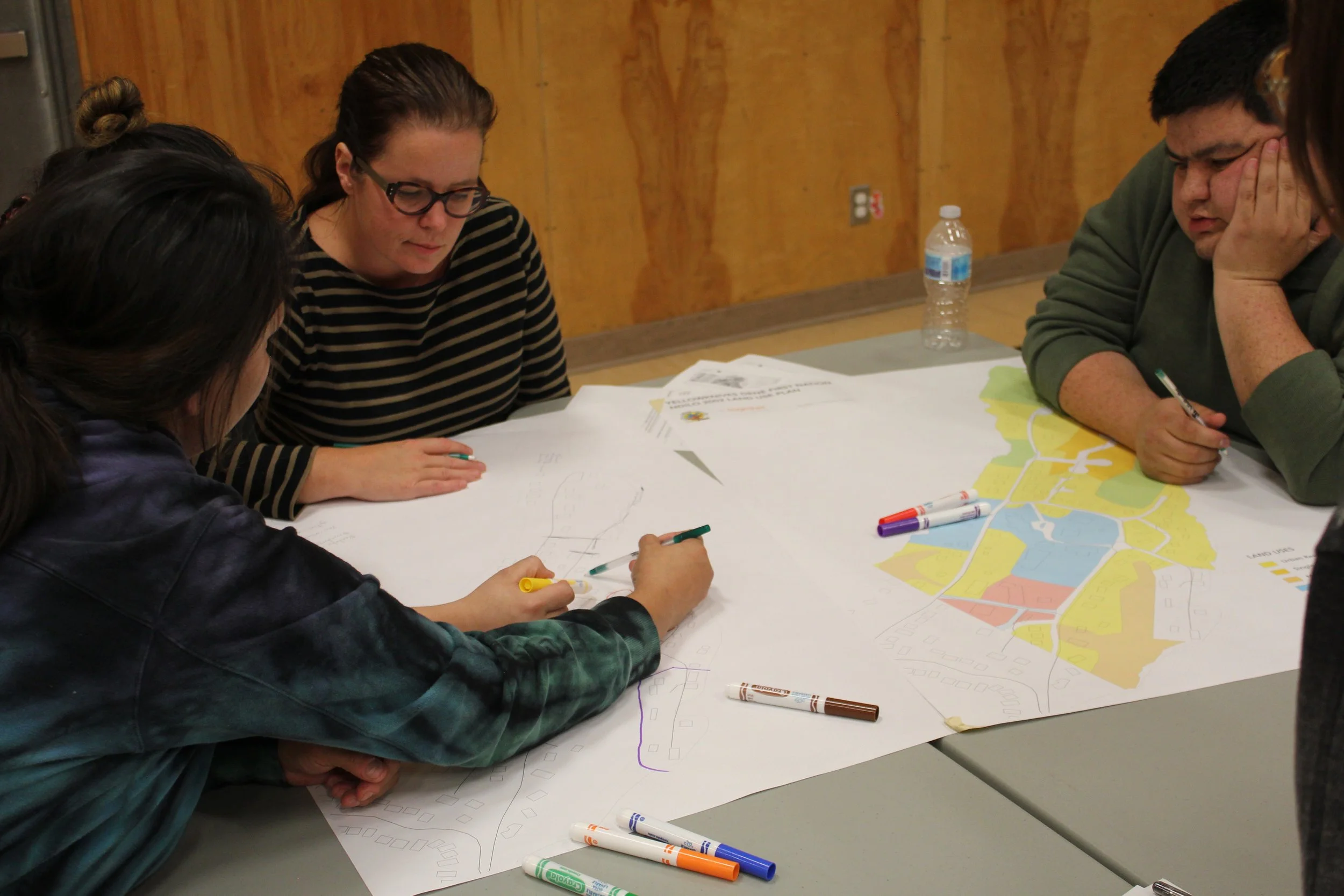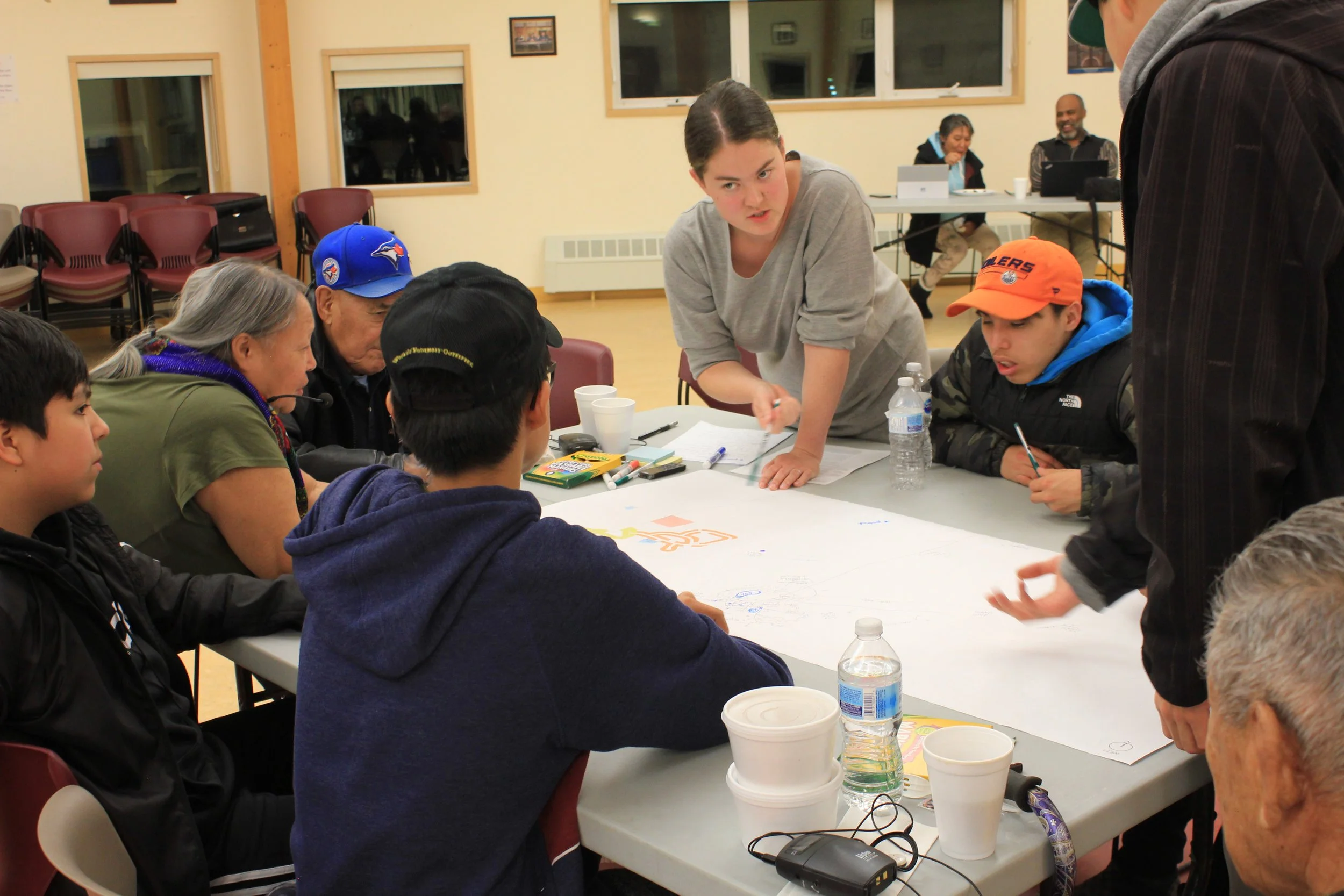Yellowknives Dene First Nation Housing Strategy
In 2019, leaders of Yellowknives Dene First Nation (YKDFN) raised a major concern: many members were struggling to access housing that met their needs. Existing programs offered by the territorial and federal government were not doing enough to center community priorities and help all members access affordable, safe and appropriate housing in Ndilo and Dettah, or in other communities in Northwest Territories. To improve housing outcomes, YKDFN recognized that it had to step outside of the housing systems that have been imposed on Northwest Territories’ First Nations by external governments and lead the way in discovering new pathways toward local, territorial and local housing change. In response, Chiefs and Council called for the development of a YKDFN Housing Strategy. The Strategy was intended to create community-based solutions for local control of housing in line with the unique values of YKDFN members.
YKDFN partnered with TDL to support the engagement and development of a housing strategy. The goal of the partnership was to co-develop a Housing Strategy created by YKDFN, for YKDFN, to ensure the future of housing for YKDFN members was shaped by their own voices, experiences and perspectives.
Over four years, TDL worked with YKDFN leadership, administration and community members to listen and learn about YKDFN’s housing history, present challenges and aspirations to develop a Housing Strategy that presents a vision for the future. At all stages of engagement, YKDFN members were positioned as experts in their local and lived experience, and were engaged both in-person and virtually when the COVID-19 pandemic made it impossible to gather in-person. The creation of YKDFN Housing Strategy is one part of YKDFN’s ongoing effort to advocate for change to housing systems, programs and outcomes in Ndilo and Dettah, and across the Northwest Territories.
Guided by curiosity, the project began by asking:
What housing values and priorities are important to members of YKDFN? How might YKDFN reimagine current systems of housing governance, building, design, and planning in the Northwest Territories?
Who was involved?
In partnership with YKDFN, the development of YKDFN Housing Strategy involved several years of relationship building and engagement with YKDFN members living in Ndilo, Dettah, Yellowknife and beyond, including YKDFN Chiefs and Council, administration, business owners, youth, and Elders. At all stages of engagement, all YKDFN members were centered as experts in the housing needs of themselves, their families and their communities.
What was TDL’s role?
TDL was tasked with conducting qualitative engagement focused on identifying and advancing community priorities. This included designing and facilitating activities, surveys, and workshops that allowed YKDFN members to participate in shaping all aspects of housing in their community. In addition to visioning sessions, the TDL team facilitated participatory decision making processes that led to the co-development of the Gonè Gokǫ̀ Housing Society which provides community-led policy and governance of housing in YKDFN.
In addition to qualitative engagement, the TDL team launched a quantitative Housing Survey and Needs Assessment in 2021. Informed by community-identified metrics, the survey engaged YKDFN members and households in identifying local housing needs. The needs assessment involved a household survey that focused on household demographics, housing quality, state of repair, and household socioeconomic status as well as an individual survey that focused on subjective experiences of home. Data was collected, analyzed, and reported by the TDL team. Findings from the needs assessment corroborated the stories of community members, and supported the development of YKDFN-specific housing policies as identified by community members.
Together, the TDL team compiled quantitative and qualitative data gathered from community conversations to develop a clear policy framework and cohesive vision for housing change created by YKDFN, for YKDFN - namely, the YKDFN Housing Strategy.
What types of engagement occurred?
The TDL team hosted open houses, designed workbook activities, and facilitated focused workshops to identify the housing values that were important to YKDFN members. To achieve participatory engagement goals, the TDL team launched a Housing Strategy working group to advise on engagement design and help shape recommendations to Chiefs and Council. Workshops were first shared with the working group and Chiefs and Council before inviting broader community members into the conversations. Once initial feedback had been collected, TDL reported findings back to the working group, Chiefs and Council, and the YKDFN Elders Senate who acted as advisors throughout the process.
Open Houses
In 2019, hosted a series of open houses to conduct exploratory engagement about housing in YKDFN, asking community members: What does having a safe home feel like to you? What goals do you have for housing in your community? The sessions included weekday, weeknight, and weekend options, to try to engage as many community members as possible. Early feedback highlighted the ways in which individuals and families had become disconnected from home, and how home itself in YKDFN had become a concept connected to governance through Housing Northwest Territories (formerly Northwest Territories Housing Corporation), and disconnected from local concerns.
Through Open House engagements, the TDL team worked closely with community members to identify local housing issues and priorities, leading to the development of a vision for housing change in YKDFN informed by four pillars: (1) community planning, (2) data and advocacy, (3) design, and (4) governance.
Community Workshops
Building upon the four pillars identified by YKDFN members, a series of focused virtual and in-person workshops were hosted to further clarify elements within the themes of community planning, data and advocacy, design, and governance. In-person workshops were hosted in community centers and gymnasiums in Ndilo and Dettah, and included dinner and door prizes to encourage attendance from a range of YKDFN members.
Virtual Workshops
Virtual workshops were hosted via Microsoft Teams using slides, Jamboard, and Miro activities to engage Working Group members and Chiefs and Council. These activities were supplemented by select in-person activities hosted by YKDFN staff while the TDL team called in virtually. The goal of virtual workshops was to further refine housing priorities during the COVID-19 pandemic, when in-person gatherings were not possible.
Asynchronous Workbooks
Restrictions on in-person gatherings during the COVID-19 pandemic led to the creation of asynchronous housing workbooks which were completed by YKDFN members in Dettah and Ndilo. The workbooks were advertised on community flyers and through Facebook, with options for members to download workbooks virtually or have a printed copy delivered to their homes. Videos were also created and posted on Youtube to support workbook completion, and contributed to the identification of four YKDFN-specific housing pillars.
Housing Needs Assessment
Informed by community-identified priorities, quantitative housing data was collected in 2021 that reflected metrics specific to YKDFN members in Ndilo and Dettah. The needs assessment involved a household survey that focused on household demographics, housing quality, state of repair, and household socioeconomic status as well as an individual survey that focused on subjective experiences of home. Data was collected, analyzed, and reported by the TDL team. Findings from the needs assessment corroborated the stories of community members, and supported the development of YKDFN-specific housing policies as identified by community members.
What was learned?
Local change can’t happen without systems change.
The process of developing the YKDFN Housing Strategy demonstrated that local efforts to address housing needs in Ndilo and Dettah could not be successful without larger efforts to address systemic inequities in housing in YKDFN and across the Northwest Territories. An indirect outcome of the project was, YKDFN’s advocacy for a designated space for First Nations, Inuit and Metis housing professionals to connect with territorial governments and advance locally-identified housing agendas. These efforts led to the creation of the Northwest Territories Housing Forum which began meeting in 2023. In response to the inadequacy of existing territorial housing policies, the Housing Forum provides a space to prioritize Indigenous-led housing agendas.
The process of developing the Housing Forum demonstrated that systems change is complicated when structural aspects of social and political systems, including inadequate housing resources and policies, create competition between communities in crisis. Project members learned that keeping diverse stakeholder groups on the same page while working toward similar housing goals is a politically fraught process, further complicated by insufficient housing resources in the Northwest Territories.
Quantitative needs assessments are not an effective method to address crises.
For decades prior to 2019, members of YKDFN had emphasized the urgency of the housing crisis in their community. Yet, without quantitative data, they were unable to advocate for funding to support projects to advance housing systems change. Significant time and resources were required to complete the YKDFN Housing Survey and Needs Assessment, only to have the quantitative data corroborate qualitative stories that YKDFN members had previously shared. Effective systems change requires recognizing and acting on qualitative concerns expressed by community members on-the-ground instead of waiting for the time and resources required to develop quantitative metrics.
Responding to unique political moments is critical when advancing systems change.
When advocating for housing systems change in YKDFN it was necessary to give broader attention to housing systems and changes across the Northwest Territories. The strategic renewal of Housing Northwest Territories and increases in housing funding by the federal government were two political moments that YKDFN was able to harness which significantly influenced the direction and success of the project.
Project Partners
Yellowknives Dene First Nation


